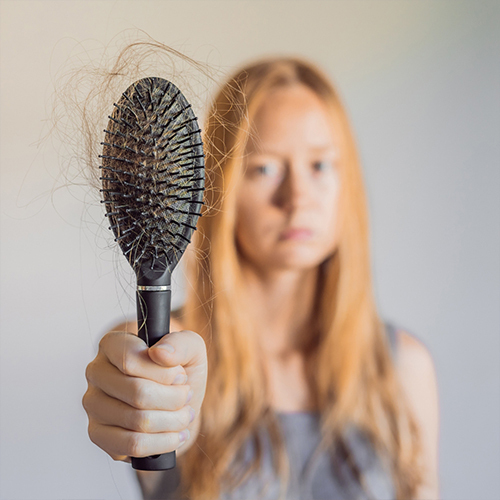Stress
Stress and anxiety can cause your hair to fall out, primarily because stress reduces the blood supply to your hair follicles. While reducing your stress levels often restore your hair, you benefit from stress-related hair loss treatment by a hair loss professional like Dr. Gary Linkov at hair restoration center in Manhattan. The latest stress hair loss treatments are available in New York City. Call today for an accurate diagnosis and effective treatment for your stress hair loss.

What Is Stress?
Stress is a normal reaction in the body to what you perceive to be difficult physical, emotional and intellectual situations. New or unexpected life events trigger stress when you feel threatened, whether the danger is real or imagined. The feeling of loss of control over a situation also causes stress.
People react to stress in different ways, often experiencing strong physical and emotional changes. One symptom of high stress levels is hair loss that’s not caused by any other underlying health conditions. At Linkov Hair Surgery in New York City, you’ll find Dr. Gary Linkov, a hair restoration specialist who employs a multi-disciplinary approach to stress hair loss treatment for men, and stress-related hair loss treatments for women.

How Does Stress Cause Hair Loss?
Chronic stress puts you at risk for a variety of health problems, both physiological and psychological. People suffering from chronic stress often experience anxiety, digestion problems and depression. Research now shows that long-term stress may lead to physical changes like hair loss in different ways, including:
- Corticosterone and cortisol production Unexpected changes in the environment, dangerous situations and perceived threats all can lead to increased corticosterone levels. This hormone, which is stimulated by mild stress, reduces hair growth.
- Your body’s immune system Severe stress may cause alopecia areata, an autoimmune disease. Your body’s own immune system attacks your hair follicles, causing male pattern baldness and female pattern hair loss. You lose hair, and it doesn’t grow back as fully until the hormone imbalance is corrected.
- Trichotillomania Some people get an irresistible urge to pull out their hair or scratch their head when stressed. Excessive hair pulling, called trichotillomania, is one of the involuntary ways people deal with negative or uncomfortable feelings, including anxiety and stress.
At Linkov Hair Surgery in Manhattan, a doctor who specializes in stress hair loss examines you to determine whether high stress levels are causing your hair loss. Dr. Linkov has access to advanced medical equipment for diagnosis before deciding on an individualized hair loss treatment that’s right for you.

Am I Suffering from Stress-Related Hair Loss?
Hair loss may result from a variety of conditions, so you need a firm diagnosis to determine if stress is the underlying cause. The signs your doctor looks for to determine if you’re suffering from stress hair loss include:
- More hairs left on your bedding and clothes than usual
- An urge to pull out your hair
- More hair left on your brush or in the shower drain
- A diffuse pattern of hair loss
- Bald patches appearing suddenly on your scalp
- Less hair density than normal
During your initial consultation, your hair restoration doctor in New York City may request various tests to assess your type of hair loss. In fact, addressing underlying conditions often reduces your stress levels enough to ease your hair loss. Other causes of hair loss may include:
Why Is Stress Hair Loss a Serious Condition?
Hair loss is a common cause of distress in both men and women. With the hectic nature of life today, people generally experience higher stress levels, and hair loss is one of the resulting health consequences. This condition requires stress hair loss treatment to avoid physical and emotional problems that may include:
- Low self-esteem
- Anti-social personality disorder
- Post-traumatic stress disorder (PTSD)
- Generalized anxiety disorder
- Major depression
- Adjustment disorders
- Obsessive-compulsive disorder
- Panic disorder
- Suicidal intent
Hair loss from stress may be one of the more noticeable signs of depression, but it’s far from the most serious consequence. While a hair loss specialist can treat your symptoms, any of the physical and emotional issues listed here may require the intervention of a trained psychologist.
What’s the Best Stress-Related Hair Loss Treatment?
Your stress-related hair loss treatment starts with an examination, a review of your medical history and an assessment of your hair loss symptoms. After your stress hair loss specialist reaches a diagnosis, the recommended hair loss due to stress and anxiety treatment may include one or more treatment options, such as:
- Changes to your habits or lifestyle Your New York Linkov Hair Surgery expert may recommend changing your lifestyle or eliminating certain habits to reduce your stress levels. A healthy diet, exercising and relaxation techniques are some ways to handle stress and reduce hair loss in your life.
- Medications Topical or ingested medicine such as minoxidil or finasteride speed up your body’s own hair growth process by increasing blood supply to your hair follicles.
- Professional in-office treatments If conservative, non-invasive treatments don’t work, your doctor may recommend more advanced procedures, such as follicular unit extraction and follicular unit transplantation, two types of surgical hair transplants.
Hair transplants for women and for men at Linkov Hair Surgery in NYC are among the most popular long-term stress hair loss treatments. If you’ve tried home remedies, supplements or other conservative hair treatment techniques without success, Dr. Linkov and his team can offer alternative therapies. Even if you don’t want a surgical treatment, you may be a good candidate for such effective hair restoration techniques as:.
Contact the best hair restoration clinic in New York today for a consultation, diagnosis and treatment for your stress hair loss.

Linkov Hair Surgery
150 E 56th St, #1A
New York, NY 10022
(212) 970-9404

